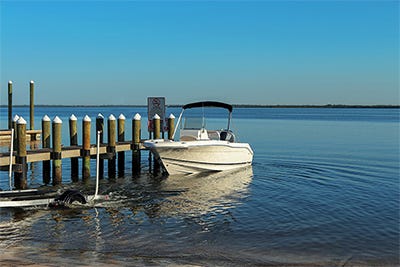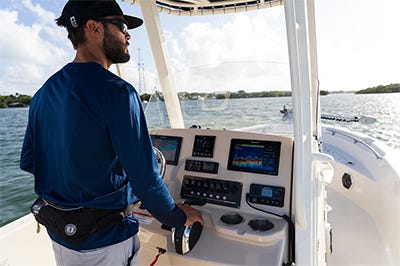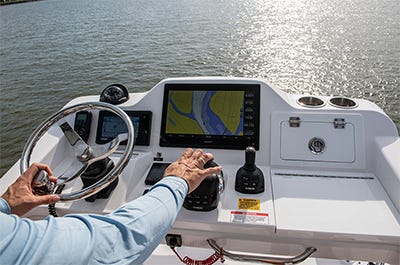

There is nothing more exciting than purchasing your first boat. Whether that boat is “showroom new” or just new to you, the anticipation of your maiden voyage as “captain” is hard to beat.
It can also be a little nerve-wracking. Without proper forethought, a lot can go wrong, putting both your new boat and your occupants at risk. With a little planning, however, you can ensure that your first trip goes smoothly, and that your journey towards being a truly qualified “captain” is a smooth one.
Contents
- 1. The Importance of Boating Education Before Your First Voyage
- 1.1 Boating License Requirements
- 2. Avoid a Maiden Voyage Nightmare
- 3. Tips to Ensure a Successful Maiden Voyage
- 3.1 Pick your Day Carefully
- 3.1.1 Avoid Weekends and Holidays
- 3.1.2 Look for calm conditions
- 3.1.3 Weather, tide, and water levels
- 3.2 Learning Your Boat Comes Before Entertaining Guests
- 3.3 Consider Your Crew
- 3.4 Learn the Water Before You Get in the Boat
- 3.5 Keep it Simple, Captain
- 3.6 Getting Comfortable With your Vessel
- 3.7 Mastering your Boat
The Importance of Boating Education Before Your First Voyage
Before you even start planning your maiden voyage, however, it’s important to recognize the complexity of boating and get an education. Think about it — when you started driving, you didn’t just jump into the driver’s seat and “see how things went.”
You probably had to study to learn the rules of the road. You also spent time learning to drive with someone more experienced in the passenger seat.
You likely took a year or more to get your driver’s license, and even then, you were probably terrified the first few times you drove by yourself. A healthy sense of fear may have even kept you out of an accident.
Boating License Requirements
In most states, there is either no boating license requirement, or the process to get it is very basic. That fact often leads people to believe that if you can drive a car, you can drive a boat.
While there are some similarities, the rules of navigation, the hazards and the basic dynamics of how a boat behaves in the water are vastly different.
The good news is that it’s not hard to learn what you need to know about boating. You simply need to recognize the need to educate yourself. Regardless of whether your state requires a boater safety course, take one and take it seriously.
Whatever your state may require, it is generally wise to go beyond those minimums to ensure you are ready
When you are on the water, the “streets” are invisible, but there are clear rules-of-the-road that need to be followed. Wide open water isn’t as wide open as you may think, and you need to know what to look for. A boater safety course is a great way to get oriented to basic navigational principals.
Avoid a Maiden Voyage Nightmare
We’ve all seen it or heard the stories: A young family with kids in a shiny new boat, sitting high aground on a sandbar or oyster bed, waving for help. The captain is embarrassed as he watches other boaters drive by laughing or shaking their heads, and the occupants are upset, scared or both. It’s exactly the maiden voyage nightmare you definitely want to avoid.
No matter how eager you are for that first trip, take the time to plan your maiden voyage carefully.
Pick the right day, study the local waters and bring along some expertise to help you learn the ropes. It’s a good idea to get a couple of good trips under your belt before you invite guests out for a day on the water.
Tips to Ensure a Successful Maiden Voyage
Embarking on your maiden voyage as a new boat owner is an exciting moment, with many new adventures on the water. However, the key to a successful first trip lies in careful planning. In this article, we'll explore essential tips to ensure a successful maiden voyage.
Pick Your Day Carefully
Your first trip should be made in the best possible conditions. Wind, weather, tide and traffic should all be factored into your maiden voyage plans.
Stress and pressure leads to mistakes, so the more you can do to minimize these two factors, the better your trip will go.
Avoid Weekends and Holidays:
If you can plan your maiden during the week, you will avoid a lot of pressure at the ramp, marina and busy channels.
Trying to launch your boat for the first time is a stressful experience, but with a line of trucks and trailers waiting on you on a beautiful Saturday morning, it is exponentially worse.A maiden trip on a weekday will allow you to take your time and focus on what you need to learn.
Look for calm conditions:
Wind speed and direction should always be a major factor in your decision. Keep in mind that wind is always stronger on the water, so any forecast over 10 knots or mph should be taken seriously.
Experienced boaters often quip that a forecast for 10 to 15 knots means you need to add the two numbers together.
Wind makes everything more difficult, not only generating rough conditions but also causing your boat to drift when docking or trailering. Combined with an opposing tide, double-digit wind conditions can create truly dangerous conditions.
Weather, tide, and water levels:
If there is rain or fog in the forecast, pick another day. A bright sunny day is not only more pleasant, it also improves visibility and can help you see dangers earlier.
Also consider the water levels of the area you plan to do your maiden, whether driven by the tide or, in the case of rivers or lakes, fluctuations based on recent rainfall. Low water levels can be less forgiving for navigational errors and require more experience than you may have. High water levels can present challenges as well. If conditions are “unusual,” consider alternative dates or locations.
Eventually, you will likely learn how to navigate all of these conditions safely, but your maiden trip will have enough lessons to keep you busy without these factors involved.
Learning Your Boat Comes Before Entertaining Guests
One of the most common mistakes new boaters make is to invite friends and family out on their maiden trip.
The reality is that you are likely to make embarrassing mistakes on that trip and potentially put your guests at risk.
Consider Your Crew
Even if you have prior boating experience, the distraction of entertaining your guests can pull your attention away from becoming familiar with the unique characteristics of your new boat.
Save that family excursion for a little later, and instead, plan the maiden trip with an experienced friend who can eliminate guesswork and potentially save you from embarrassment.
One way or another, you are going to learn a lot on your first few trips out, so it is wise to plan your maiden trip — and several trips thereafter — with someone who can guide you through the initial challenges. When the time comes to take the family or friends out, you will be in a much better position to show them a great time.
Learn the Water Before You Get in the Boat
Taking time to learn a little about the area you will be navigating before your trip is always a good idea, particularly in saltwater situations. Hazards that are not apparent at high tide can be catastrophic at low tide.
Hazards that are not apparent at high tide can be catastrophic at low tide.
Simply knowing how to navigate from a ramp or marina to open water can be incredibly confusing, and doing it wrong can have serious consequences. It might seem embarrassing to ask another boater about the area, or request to follow them out to deeper water, but a little humility can save you thousands in repairs. Most boaters are happy to lend expertise, especially in challenging waters.
Keep It Simple, Captain
If you want to accelerate your learning curve, make your first few trips about learning to run the boat, and don’t try to include other activities. That means leaving the rod and tackle in the car, the skis stowed in the locker, and any adult beverages you might enjoy at the sandbar in the refrigerator at home.
Plan your trip around what you want to learn and dedicate the entire trip to that purpose.
Getting Comfortable with your Vessel
As a new boat owner, there is enough to learn to take up several trips. Take time before each trip to think about what you want to get comfortable doing.
Launching and retrieving with a trailer, docking from different angles, learning where to go (and where not to), navigating over boat wakes — each of these can take time to get comfortable with.
Mastering your Boat
You will also want to get a feel for the specific characteristics of your boat, such as learning how it needs to be trimmed to get the most fuel efficiency and how to get the best ride in chop. Your boat may have features you haven’t used before, such as trim tabs, anchoring systems, electronics or a trolling motor.
A concentrated, deliberate approach will maximize the time spent practicing these skills and will get you proficient much more quickly.
Take time to make a mental checklist of the skills you want to learn and give yourself time to get comfortable.
As a new boat owner, you are at the beginning of a long-term relationship with your boat. Treat your maiden voyage like you would a first date — well planned, thoughtfully executed, with the attention to detail that ensures everyone has a good time.
Like any relationship, there will be plenty of tough conditions, unexpected situations and occasional mistakes. Starting out with a solid foundation based on knowledge and practice will help you navigate future challenges more confidently.



